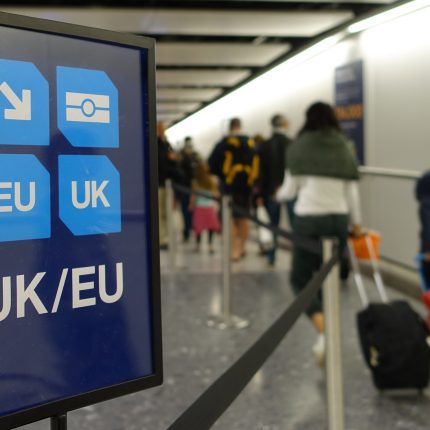
Rejoining the EU by stealth won’t fix our economy
13 Oct 2025
This article was first published in CapX
Nine years after the referendum, the British establishment claims to have reconciled itself to Brexit. Having once championed a second referendum, Keir Starmer said some time ago that he now wants to ‘make Brexit work’. In a time when Labour’s main political threat comes from Reform UK and Nigel Farage, one would think that the Prime Minister meant it.
But one would be wrong. The news cycle has forgotten it, but back in May this year, the UK committed to a momentous and likely disastrous ‘reset’ in its relationship with the EU. Make no mistake: although negotiations carry on quietly in the background, this will roll back nine years of post-Brexit progress, hitching our fortunes to a dying star as the EU’s economy continues to decline and as its leaders seek desperately to impose uniformity on an increasingly fractious political project. It has set us on a road to nowhere.
May’s reset resulted in the ‘Renewed Agenda for European Union – United Kingdom Cooperation Common Understanding’. Buried beneath the language of diplomacy, there is a burdensome set of demands. Most notably, for the benefit of reduced friction on food trade with the EU, Britain would be required to ‘dynamically align’ with EU standards on food and agriculture and carbon pricing. That is, whenever the EU changes its rules on these things, the UK would have to follow suit and remain aligned, even for products which never go anywhere near the English Channel.
Since May, further terms from the EU have included future-proofing alignment to cover AI laws, a Youth Mobility Scheme, and a UK-funded Erasmus+ programme. It is little wonder that Lord Frost, in his foreword to the Prosperity Institute’s new report on the issue, co-authored by myself and Fred de Fossard, characterises this as a deal which ‘gives away important British interests for very little in return’. Rather than having an honest debate about the feasibility of improving the Trade and Cooperation Agreement (TCA) agreed with the EU in 2020, we have simply rolled over. For supposedly shorter airport queues, the Labour Government seems ready to commit Britain to regulatory serfdom under the EU.
Here is a picture of life after the reset. When Brussels wishes to update its regulations, London must conform or risk trade-barrier reimposition; manufacturers would have to adhere to EU carbon costs set to EU conditions rather than British ones; farmers must comply with EU food standards even when producing for the domestic market. Britain would become a rule-taker rather than a rule-maker, subjecting British businesses to regulatory uncertainty determined by bureaucrats in Brussels.
Consider the numbers on carbon costs. Currently, certain energy-intensive sectors including power plants, heavy industry and aviation are forced to pay various levies based on greenhouse gas emissions. Britain’s current carbon price sits at £41.84 per tonne of CO2e in contrast to the EU’s £66.48. For British manufacturers, the perverse outcome of this alignment is a 58.9% increase in carbon prices in a country that already has the highest industrial energy cost in the world. Furthermore, the EU’s forthcoming Emissions Trading Scheme 2 (ETS2) expands the remit of carbon pricing to cover transport and building infrastructure – another regulatory entanglement.
Further alignment with the EU is particularly unwise given the EU’s declining economic trajectory. The EU’s GDP growth has averaged just 1% annually for the past 20 years, and its share of global GDP has fallen from almost 25% in 1999 to 14% in 2024. Why should Britain remain tethered to this bloc?
By contrast, Britain’s trade partnerships elsewhere since signing the TCA remain promising. Our 2024 accession to the Comprehensive and Progressive Agreement on Trans-Pacific Partnership (CPTPP), which includes other Anglophone countries as well as leading economics in Asia and South America, unlocked access to a bloc whose member-states’ economic growth has been at 6% since 2020. Sadly, the current trade strategy withers on the vine.
Trade agreements with the US, meanwhile, have seen an influx of new investment in AI and digital services such as combined investment of $40 billion from tech giants such as Microsoft, Nvidia and Google, while sparing Britain from the worst of the latest trade tariffs. Yet these relationships would be undermined by Britain’s dynamic realignment with the EU as it fuels investment uncertainty and poses questions concerning Britain’s regulatory autonomy over its tech sector.
The implications of the reset also prove damaging for British innovation, as well as our financial sector and planning system. The EU’s ‘precautionary principle’ – which prioritises risk avoidance over scientific evidence – would constrain British innovation (currently ranked sixth in the world). Further EU environmental regulations would exacerbate the dysfunction of our planning systems. It is a crying shame that the Product Regulation and Metrology Act stealthily provides ministers with the authority to align British manufacturing standards with the EU’s regardless of whether they cross European borders. This act desperately needs to be repealed.
Many might argue that all this loss of sovereignty is worth it for recouping lost economic benefits. But the idea that Brexit has badly damaged UK-EU trade and therefore must be undone is a myth. Trade with the EU has remained largely unconstrained since Brexit, with exports closely matching what the EU typically imports and trade volume remaining greater than expected for most trade partners. We have drifted from the EU in goods trade, but we have sustained our services trade surplus, and better goods prospects exist elsewhere. The veneer of the reset’s economic agenda merely covers a ploy by policymakers seeking to indulge halcyon Remainer tendencies. Rather than re-entering the EU’s regulatory orbit, there are more promising alternatives within our remit to consider. Any negotiations with the EU should be targeted mutual recognition agreements while maintaining regulatory divergence. Britain can also adopt innovative standards from its fellow CPTPP members rather than defaulting to EU procedures.
Most importantly, the central problems in the British economy demand domestic solutions such as sensible deregulations that would unleash productivity and boost growth, free from the EU’s prescriptive rules.
Veering back towards Brussels goes deeper than mere regulatory alignment. It will reverse the democratic control Britain regained through Brexit. The EU reset is a smokescreen for an insidious form of technocratic incrementalism which aims to drag Britain back into the EU whether it likes it or not. None of this will fix Britain’s primary domestic economic challenges such as high inflation and weak productivity. Our national ambition requires cutting back regulation at home and free trade abroad, rather than joining a declining EU on its road to nowhere.

